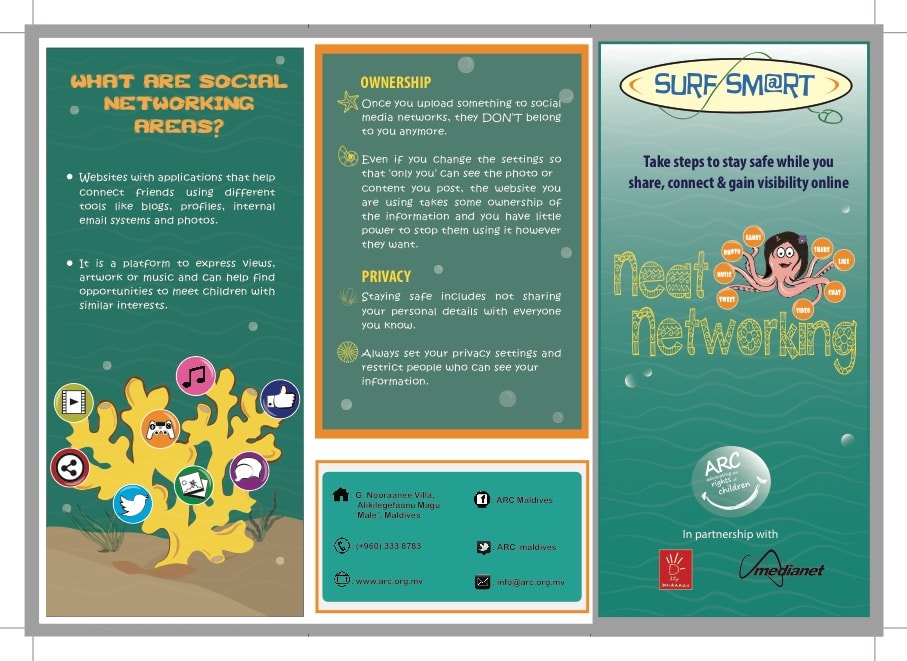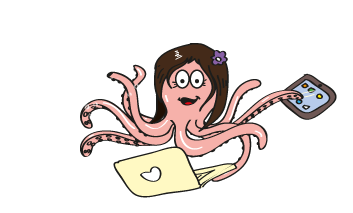
Brochure


Things you should know while you share, connect and gain visibility with friends online.
Social Networking areas are websites with applications that help connect friends using different tools like blogs, profiles, internal email systems and photos. Popular social networking sites include Facebook, Instagram, Twitter, and Foursquare, among many others. Social networking provides children with a platform to express their views, artwork or music. It offers many benefits such as facilitating social interaction, which improves social skills and improving technical competence. It can also help you find opportunities to meet children with similar interests, or link up with charity work. However, there are certain things that you should be mindful of, when using social media networks to share, connect and gain visibility online.
– Did you know that social networks effectively own your online content, by claiming the right to use, modify or transmit your photos and content in any way?
Once you upload something to Facebook, Twitter, Instagram or any other social media networks, they don't belong to you anymore. Even if you change the settings so that ‘only you’ can see the photos/content you post, the website you are using takes some ownership of the information and you have little power to stop them using it however they want. The terms of service is something people don’t really read at all when they open an account, but that is essentially what gives away almost total control of images/content posted online. Think twice before you post online!
- Facebook: When signing up to Facebook, most people take more time deciding which profile photo they will use, rather than reading the lengthy terms of service document. However, this is a legal contract and it gives Facebook a license to use your photos/videos in any way it likes. This license also allows Facebook to transfer or sub-license its rights over a user’s content, to another company or organisation if needed.
- Instagram: Similarly, by signing up to Instagram, you are giving the network the right and ability to do just about anything with your photos. In December 2012, Instagram had an especially controversial terms of service which stated that users of the site “"agree that a business or other entity may pay us (Instagram) to display your username, likeness, photos and/or actions you take, in connection with paid or sponsored content or promotions, without any compensation to you."
- Twitter: Photos posted on Twitter remains the intellectual property of the user but Twitter's terms give the company broad scope to use, change and distribute any photos, writing or video posted on Twitter and also allows it to pass any of your content to any partner organisations for any reason.
- In real life, do you think everyone you know is your friend? So why share personal information with online ‘friends’ you hardly know?
Privacy is something you should always keep in mind when you are online. Staying safe online includes not sharing your personal life with everyone you know. In real life, you wouldn’t really be friends with friends of friends of friends - so why would you trust them online by giving them access to your private life? It’s like letting someone you barely know into your own room!
Be safe about how you're choosing your friends - you shouldn’t add everyone who sends you a ‘friend’ request. Any one of your online ‘friends’ who sees your photo or video can download it to their own computer and use it as they wish. Even if you delete it from your page, the other person will still have the photo or video. Only be 'friends' with people you are happy to share information with. Also remember that it's okay to trust your online friends up to a point, but don't make yourself vulnerable to attack.
Restrict the people who can see your information and make sure you think twice about what you post online. Be aware that some of your real friends can also share what you post, which means your photos/content can also be seen by a friend of a friend, who could be a criminal and who could use the information you shared against you. There are many people who regularly check social networking sites to monitor your movements and can use this information to stalk you; burgle your homes whilst you are away on holiday, or steal new and expensive items you have, about which you talked about online. Always think before you share or post!
Strict privacy settings can also help protect you online. Don’t forget to set your privacy setting on Twitter, Facebook or any other social media. The default setting is public, which means that if it is on Facebook, a billion people can see everything you post. Set your privacy settings so that only the people you want (your closest real life friends and family) can see what you post. Also remember that some sites such as Facebook, change their privacy settings frequently. It is therefore important to familiarize yourself with the settings each time they’re updated. If you are on Facebook, also be aware of photo tagging. It might not sound like it, but is actually an important privacy issue. Check your notifications regularly for photos that your “friends” tag you in and learn how to remove unwanted tags to avoid any unintended social media mess.
Am I safe if I change and restrict my settings to ‘private’?
While strict privacy settings can help protect you online, social networks do not necessarily guarantee the security of the information that has been uploaded to a profile, even when those posts are set to be private. One such incident was in 2010, when unauthorized users were able to see the private chat logs of their contacts on Facebook. While this and other similar bugs are usually quickly fixed, it means that there is great potential for taking advantage of leaked information – and that things shared under ‘private’ settings can also at times be seen by many others.
Similarly, even if you change the settings so that ‘only you’ can see the photos/content you post, the website you are using takes some ownership of the information and you have little power to stop them using it however they want. Always remember that nothing on the Internet is 100% private and that everything you post online is there forever.